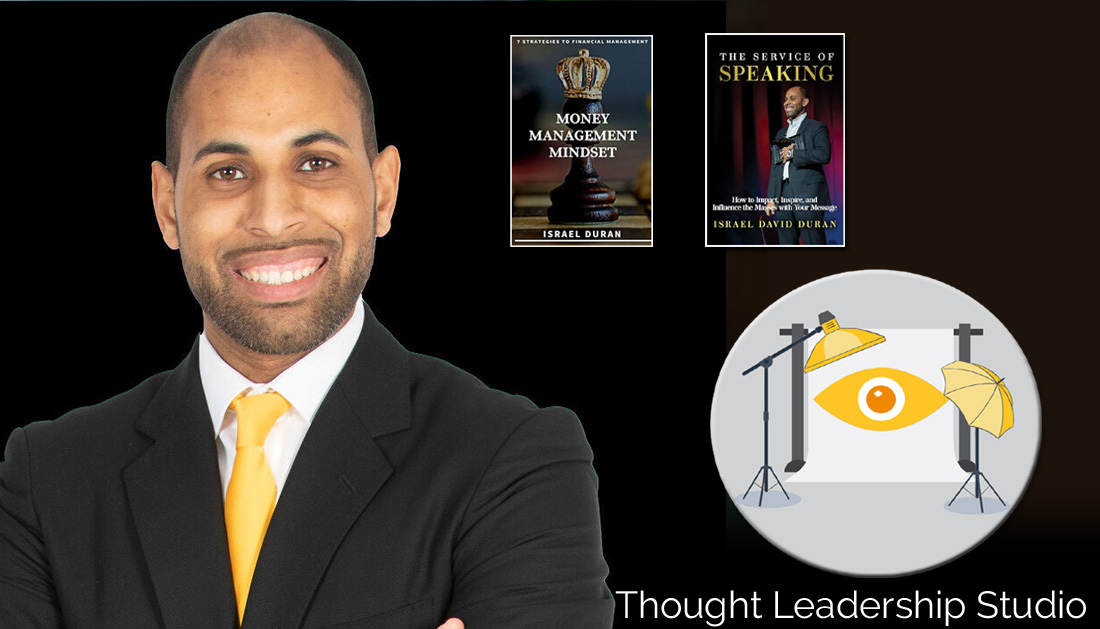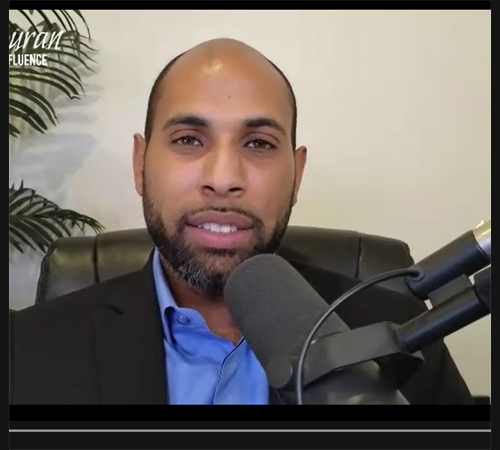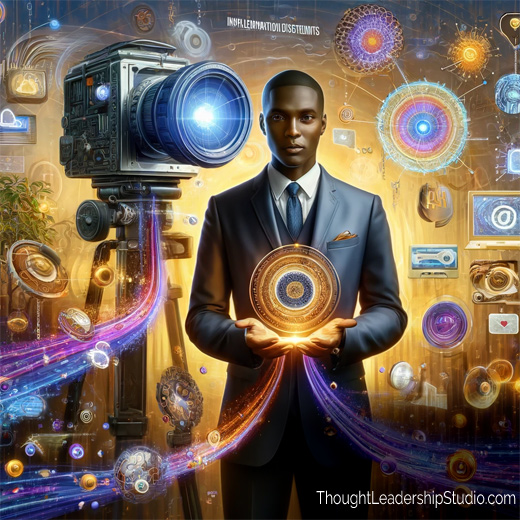Thought Leadership Studio Podcast Episodes:
Purpose-Driven Leadership with Israel Duran
Episode 88 - Unlocking Value and Wealth Consciousness: Israel Duran’s Framework for Integrating AI, Social Media, and Speaking to Amplify Impact

#ai, #artificialintelligence, #authors, #branding, #coaching, #communication, #consulting, #contentmarketing, #creativity, #entrepreneurship, #influence, #inspiration, #interview, #interviews, #leadership, #marketing, #marketingstrategy, #motivation, #personalbranding, #persuasion, #speaking, #storytelling, #strategicthoughtleadership, #thoughtleadership, #thoughtleadershipmarketingmeaningfulwork
Or Click here to listen or subscribe on appWhat this episode will do for you
:- Discover Israel Duran's Transformative Journey: Learn how pivotal life events shaped Israel's path as a purpose-driven entrepreneur, speaker, and strategist.
- Understand the Integration of Spiritual and Financial Growth: Gain insights into how aligning purpose with strategy can lead to meaningful business success.
- Leverage the Power of the "Service of Speaking Framework": Explore Israel's proven approach to integrating AI, social media, and speaking for amplifying messages and growing businesses.
- Redefine Value in Leadership and Business: Uncover Israel's unique perspective on value as a personal and contextual concept, empowering leaders to connect authentically.
- Overcome Limiting Beliefs: Learn how to challenge and transform outdated mindsets to unlock new levels of personal and professional growth.
- Practical Tools for Business Growth: Get actionable advice on using short videos, AI, and tailored strategies to expand your reach and impact.
Israel Duran.
In this episode, I’m excited to introduce Israel Duran, a spiritually-centered visionary leader dedicated to helping others discover, design, and deliver their unique gifts to the world.
Israel’s work exemplifies Strategic Thought Leadership by aligning influence with purpose and challenging outdated assumptions to create meaningful impact. As the founder of Israel Duran and Associates, he has helped countless individuals transform their expertise into thriving businesses that succeed financially and make a lasting difference.
In our conversation, Israel shares his "Service of Speaking Framework," emphasizing the integration of AI, social media and speaking as a powerful triad for amplifying messages and growing businesses. He also offers insights on defining value, overcoming limiting beliefs, and unlocking new levels of success through purposeful leadership.
Israel leaves us with practical advice for thought leaders and entrepreneurs looking to align their message, leverage technology, and make a lasting impact.
Some of Israel's coordinates:
Curated Transcript of Interview with Israel Duran
The following partial transcript is lightly edited for clarity - the full interview is on audio. Click here to listen.
Chris McNeil: I'm Chris McNeil, with Thought Leadership Studio, and I'm sitting here across Zoom with Israel Duran, who is a renowned author, speaker, entrepreneur, and business strategist dedicated to empowering purpose driven leaders to discover, design, and deliver their unique gifts to the world.
As the founder of Israel Duran and Associates, he's guided numerous entrepreneurs in leveraging their expertise to build profitable businesses that make a positive impact.
Through his proven methodologies, Israel has helped clients achieve significant growth with many reaching seven and eight figure revenues. His passion lies in aligning business success with meaningful purpose, enabling leaders to create lasting change in their industries and communities. It's great to have you here, Israel,
 Israel Duran: Chris, it's great to be on with you..
Israel Duran: Chris, it's great to be on with you..
Chris McNeil: So to give our listener who may not yet be familiar with your work, a little context, what sets you on the path that you're on today doing this kind of work?
From Crisis to Catalyst: Turning Obstacles into Purpose
Israel Duran: That's a good question, and for me, it all began with a car accident. Chris, back in 2018, I was already working. I was working a full-time job. I had some businesses on the side doing coaching, speaking, but I wasn't really doing it at the full potential of what I believed I was called to do at the time.
And I knew I was supposed to go full-time into what I'm doing now into business, but I was stuck because I had a full-time income, right? Had to take care of the bills, and I was kind of not sure if like, okay, is this really what God is calling me to do?
And I had a good experience, Chris, where I got into this car accident, which I call the catalyst that really got me out of my own way, that released my first book within three weeks from the car accident in two languages and also led me to launch my third business, which is primarily what I'm doing now with the service of speaking, and it's been history ever since.
Chris McNeil: So what happened? What was the shift in thinking that brought about?
Israel Duran: The shift was urgency. I had to make a decision that I need to release what I had inside. Now you see so many of us sometimes, and even the listener that may be listening to this, it's like sometimes we know we have a higher calling to share our experience, our expertise, our wisdom, our knowledge, but for some reason we're in our own way for some reason, we're in our own mind. We stop ourselves.
There's a great proverbs that says the road is smooth, why do we throw stones at it? And sometimes we're our biggest enemies. And that was what happened with me. I was in my own way and this car accident was used to get me out of my own way so I could finally just take action on what I knew I was supposed to take action, which was to write the book, launch the business, start speaking, get on stage and et cetera.
 Chris McNeil: Yeah, it looks like you had a lot of ideas that were dormant, but not really acting on them until that catalyst of ... was it facing your own mortality?
Chris McNeil: Yeah, it looks like you had a lot of ideas that were dormant, but not really acting on them until that catalyst of ... was it facing your own mortality?
Was it that kind of thing and realizing, hey, we don't live forever and need to do what I got to do right now.
Israel Duran: I think that had a big part to play with it. My second daughter, Annabel, was born four days before too, so it was a very emotional time for me because my father, just to give you a backstory, one of the reasons why I teach a lot of what I teach in today in terms of the speaking business that I'm in is because of what I didn't have as a child.
I have a great belief, Chris, that goes like this. What you don't have as a child, you typically value as an adult. And my father, he had an experience when he was younger where he was having chest pains all over his left side. And unfortunately he went to the hospital, my mom told him, it's like, Hey dude, you need to go check yourself out. So my dad went to the ER, he waited Chris three and a half hours at the ER.
For some reason they didn't attend him first because there was other emergencies that were more important and he went back home unfortunately, and that's where he took his last breaths and he had what we call a massive heart attack. And my mom actually found him. My mom came back from work and found him very traumatic experience for my mom. I don't really bring it up too much, he doesn't talk about it much because I don't want to bring up those memories.
But Israel David Duran, I was only about three months when my dad passed and growing up there was four specific things that I wanted from my dad that I didn't have. So again, that's why I tell people it's what you don't have as a child, you value as an adult, and it's exactly what after the car accident. Those four things are really what I've really been focused on, serving with my people that we work with and our message and making sure people have those four things, the four things that I didn't have as a child.
From Spiritual Principles to Financial Prosperity
Chris McNeil: That's awesome. So what drives you? What's your purpose? What's your deepest purpose and mission now?
Israel Duran: My deepest purpose is making sure that the kingdom of God gets advanced. I'm a believer in faith. I'm a believer in the Bible. It is big in my faith because growing up for someone like myself, it's very easy for people to say, well, oh, you just follow God or You follow the Bible because of your parents. I'm like, no, not really. Well you follow because of the influences around you. And I'm like, no, not really.
I had to grow up very quickly. I follow God because he's been in my life and he's been the most one most important thing in my life, and I do everything really to make sure I love people and I love him and serve my part in what I'm supposed to do on Earth before I leave. And I take it as a high responsibility.
Chris McNeil: That's powerful that you act from spiritual mission and yet you're also all about financial success. You've integrated those. How do you see integration of spiritual growth and financial growth?
Israel Duran: That's a very good question. I think that all spiritual principles apply for anyone, right? Let me just lay that out. Regardless of what your belief is, regardless of if you believe or have a certain religion, when you are activating a spiritual principle, they will work for you.
 And that's why a lot of people that maybe they don't serve God or they don't serve Jesus or the Bible or things like that, they're very successful. Why? Because they may be activating a spiritual principle that's actually in God's word that many times they don't know.
And that's why a lot of people that maybe they don't serve God or they don't serve Jesus or the Bible or things like that, they're very successful. Why? Because they may be activating a spiritual principle that's actually in God's word that many times they don't know.
But the opposite is also true. Sometimes you'll have people that know God, they know the Bible, but then they're not financially successful or they're struggling financially, but there's no reason why they should. Many times we violate principles because of a lack of knowledge that we just don't know what we don't know. I personally believe, to your point, Chris, that these can be integrated and it's what really we've found to help the people we've served is integrating these.
But even if someone doesn't necessarily believe, the results speak for themselves, you can't argue with the data or the math of when people, they're more empathetic. They walk in connection, they walk in serving others, they have that servant leadership talking about thought leadership. They have that servant leadership mindset that they're looking to serve others rather than themselves. Those are people that typically grow financially, and I think there's a lot of correlations.
How AI, Social Media, and Speaking Can Revolutionize Your Business
Chris McNeil: I love that. I love the whole servant leadership principle too, and we're all part of, however you would phrase it, whatever religion or background you're from, we're all part of a larger system. And if we don't serve that system, hey, it's part of us. We're not going to be congruent with it in our hearts and our minds and in our success. And you do a lot of coaching and speaking, I understand. Is that correct? ... Around these kinds of things ...
Israel Duran: Yeah, that's part primary business is helping people get their message out there through speaking through stages and helping them monetize their life's experience. But it's based on a lot of sharing, either one-on-one or in groups as well, and it's been really cool.
Chris McNeil: Where do you move from diagnosis to intervention in those situations, whether it's working with an organization, leading an audience, working with an individual to either help people themselves see where the need to make change and how to implement that change and integrate it fully into their lives or into their organizations and their lives?
 Israel Duran: Yeah, I think there's a few things. And by the way, Chris, you're asking some amazing podcast questions here. I hope everybody's getting some value. I think that number one, in today's society, gone are the days of just depending on brick and mortar, for all the business owners that are listening, small business owners, c-suite, go on, are the days of avoiding the internet. You know what I mean?
Israel Duran: Yeah, I think there's a few things. And by the way, Chris, you're asking some amazing podcast questions here. I hope everybody's getting some value. I think that number one, in today's society, gone are the days of just depending on brick and mortar, for all the business owners that are listening, small business owners, c-suite, go on, are the days of avoiding the internet. You know what I mean?
Before we could get away with it, when we're like, okay, we're just going to depend on our Rolodex of clients. We are going to depend on our clients that we have, and we're just going to just stay with the brick and mortar. That's been the philosophy for, I would say a large part to many of these businesses over the last 25 years, over the last maybe five years that things have changed, but people are still depending on brick and mortar.
Before Covid, when Covid happened, Chris, there was a shift. Zoom grew exponentially. And today in the day of AI, I was just talking about this today, it doesn't matter where you are, what diagnosis you receive, what distinction you receive from your current business, what should be a part of your game plan moving forward should be the following. And I talked about this morning, it should be integrated AI, number one. Number two, social media, and number three, speaking.
Those three things, Chris, if anybody that's under the sound of our voice here seeks to integrate those three things, their business will have nothing more, nothing else to do, but to grow, but to expand and in a way that's very authentic to them in a way that's very congruent in a way that will work for them. I'm a great believer, Chris, that accustomed suit always fits better than one off the rack. And what AI does, what speaking does, what social media does, it allows us to create custom content, custom knowledge out there that we can support our vendors, our clients, our partners, and really educate the market with the internet in these days that can really make a difference for people's bottom line and impact.
Message Clarity and Short Video Strategy: Modern Marketing Essentials
Chris McNeil: Yeah, I love that. And it's all about empowerment, isn't it? And I love that triad of AI, social media, and speaking. It's like the three legs of the stool. If one of them is missing, the stool may not stand up, you need all three to balance it. How do you see integrating those things? If someone's listening to this and they're thinking, well, I'm doing a little bit of AI stuff, not really doing my speaking though, maybe I should do more of that, or I'm probably not using social media to the fullest because I get busy or my clientele's busy or my business is busy and I set it aside and try to get back to it, or I just delegate it and don't look at it, what's the path to really integrating those three aspects fully and completely so that they pay off and they're fulfilling?
Israel Duran: Our framework that we teach is called service of speaking framework. Just a quick note before going into the question. I believe that speaking is the highest level of service, so doesn't matter. Whatever business you're in, these elements will help serve in your industry when it comes to leveraging AI, social media in the stages. There's one specific level that's really level number one in our framework that we teach that's very critical for people to understand and know before actually going out there and leveraging AI, before getting on social media, before getting on stages.
 So that first level is what I call having your stone or having your message to market very clear. And the reason why this is so important, Chris, is because depending on what your message is and who your market is, that will then dictate what I would recommend in helping you get on the right stages, helping you leverage the right social media platforms and helping you integrate AI to serve your demographic and whatever goal you're looking to do. Does that make sense?
So that first level is what I call having your stone or having your message to market very clear. And the reason why this is so important, Chris, is because depending on what your message is and who your market is, that will then dictate what I would recommend in helping you get on the right stages, helping you leverage the right social media platforms and helping you integrate AI to serve your demographic and whatever goal you're looking to do. Does that make sense?
Chris McNeil: It does, absolutely.
Israel Duran: And because it's like people can just tell somebody a cookie cutter solution, like, well do this, but it really depends on what industry are they in, what role do they play? Are they the face of the company? But just to give people some pointers, everyone should be using what we call short videos. Now, short video, I mean just in the last 28 days, I just did a training this morning on it. We had 32,000 views on our YouTube transparently. Chris, I started my YouTube channel back in 2009.
Chris McNeil: You were early.
Israel Duran: Yeah. And I probably in the path of 2009 till about 2023 really, I've had about 2,800 subscribers, which is not a lot. Right? Just in the last year we've had over a thousand, just in the last 28 days, we've had over 300, just in the last 28 days, we had over 32,000 views. I just crossed a million views on my YouTube.
Chris McNeil: Sweet.
Israel Duran: The Secret has been using shorts. Now, when I talk about shorts, shorts are 60 second videos. And even if you can get them under 30 seconds and less, it's better because the algorithm will favor those because it'll have more watch time and the shorts are there. And then what you want to do with your shorts, you want to use AI to create subtitles under the shorts. So this is how we're able to integrate AI, just something very standard. You create a 60 second clip used AI, there's a tool called vid.io is a very good tool, vid.io.
There's a bunch of other tools out there, but the point is leverage the technology to save you time. Then now you can put out content more quicker and more efficiently on YouTube. Pretty much everyone should be on YouTube. That's why I'm talking about YouTube because pretty much literally every single business doesn't matter what, you could be a c-suite. YouTube is really good because YouTube's algorithm will essentially put you in front of the people that you're looking for, and then they'll pay you to put your clients in front of you, which is crazy to me. So just some point, I could go deeper, but I don't want to be long-winded here, but I hope that that gives somebody some clarity there on how to integrate just from a level one perspective.
Challenging Mindsets: Unlocking New Levels of Success
Chris McNeil: Well, you've brought some great points and you asked me some about the work I do as well, and a lot of it's helping people do things like we're talking about and being time efficient because it's just a mental model, it's a belief system. And you mentioned your pivotal event car wreck, you probably challenged some of your own belief systems about what your life meant and what your purpose is.
Israel Duran: 100%
Chris McNeil: So we all have belief systems and sometimes we need to examine and challenge those because you can be impediments to living fully and succeeding at the highest level. And one of those is the time issue. "I don't have time." "How do I make time to do all this video production?"
And you brought using artificial intelligence as part of that and being efficient with it. And you clearly speak with purpose, and I'm sure you work with people in helping them speak with purpose as well. And we talked about finding your message, your core message. That's what we're all about. And Strategic Thought Leadership, the theme of this podcast, is about strategically challenging assumptions that exist in the field, profession, product or service category, whatever we find ourselves in. There's old thinking and some of it's probably stale old thinking that merits some challenges.
Just like with our (individual)belief systems, there's belief systems in the marketplace that are prevalent that we want the challenge with our own message to lead people to more value.
What are the lever points that you find that really make a difference in helping people lead others to more value? When do you see patterns or themes where it's like this is a strategy that is really something that should be implemented in most of the people I work with is prevalent.
 Israel Duran: I mean, I'm loving these questions you're asking, Chris. On a serious note. I think number one, let's define value. The way I define value is spiritual. You see? And all things that are spiritual only have the value that you and I give it. That's the way I defined it. For example, music is a good example. Music is spiritual. So someone, Chris may like slow music or somebody else likes fast music, and then somebody else says, well, I don't like slow music or fast music. I like instrumentals. You see how, depending on who the person is, they may value something differently. It's the same way with anything we see valuable as.
Israel Duran: I mean, I'm loving these questions you're asking, Chris. On a serious note. I think number one, let's define value. The way I define value is spiritual. You see? And all things that are spiritual only have the value that you and I give it. That's the way I defined it. For example, music is a good example. Music is spiritual. So someone, Chris may like slow music or somebody else likes fast music, and then somebody else says, well, I don't like slow music or fast music. I like instrumentals. You see how, depending on who the person is, they may value something differently. It's the same way with anything we see valuable as.
Same thing with money. $5,000 can be a lot of money to somebody. That could be what somebody spends daily on just their employees, right? They're like 5,000, that's what I have to cover just to take care of my team ... Somebody else, $50,000 can be a lot of money to somebody else. That may be what they pay weekly just to take care of their business operations, right? A hundred thousand may mean be a lot of money to somebody, but that may be what someone's losing a month to month because they're not unlocking the power of social media or speaking, right?
So money, music, I have that teaching money is just like music. They're both spiritual and they only have the value that you and I give it. So when we ask the question, well, how can we give value to people? It really depends on what they value. Now, if people value growing businesses that they value getting their messages out there, making sure that they reach the people that they're called to reach, then some of the things that I have to teach may be valuable to them because we're going to show them or we can show them how to use AI, social media and stages to get their messages out there in record time.
And you're a hundred percent correct, Chris. It's typically a mindset that has been helping people or empowering them to live a certain life, but that mindset will also keep them from getting to their next level. One of my good friends, Marshall Goldsmith, we did an interview with him. He wrote the book, what Got you Here won't get you there. What got you to where you are now won't get you to the next level. There's typically, at least in my life, there's been always a transition of a new way of thinking to help me get to that new level of living.
***************************************
The transcript is lightly edited for clarity and is a partial transcript- the full interview is on audio. Click here to listen.
***************************************
Free Stuff and Offers Mentioned in Podcast
***************************************
***************************************